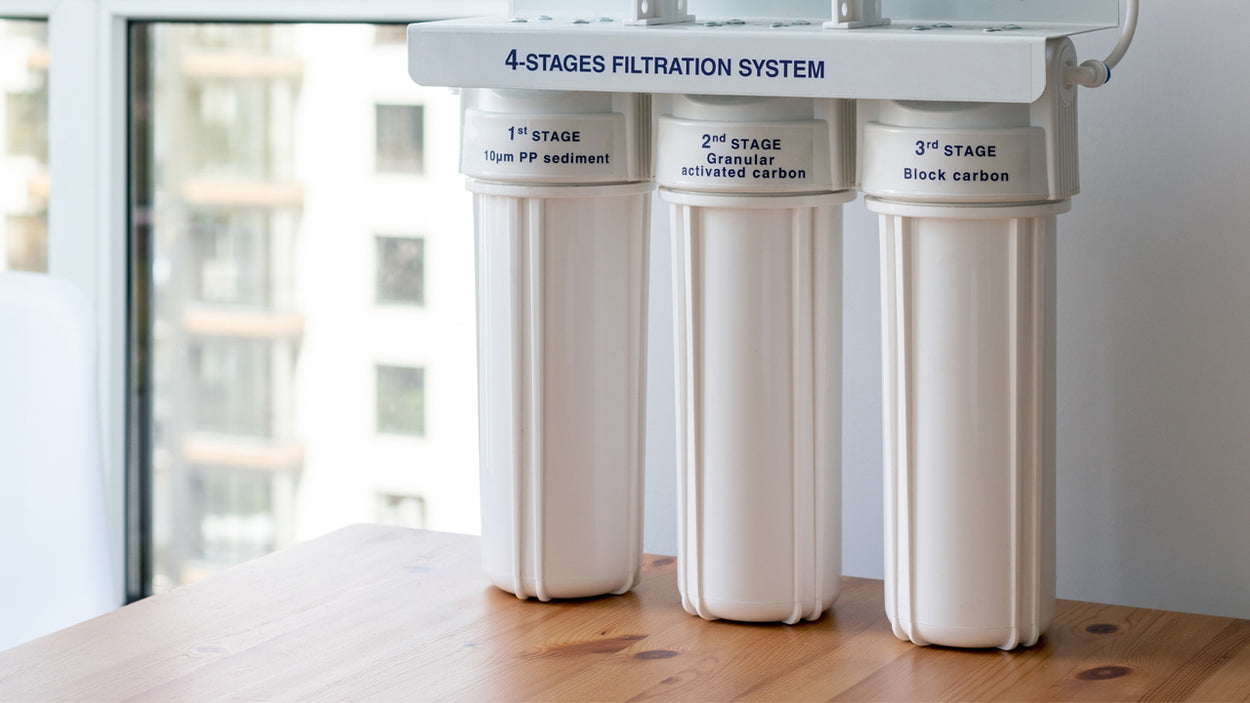Whether it’s in pursuit of a healthier lifestyle or a desire to enhance your water supply, few things are as crucial as access to clean, purified drinking water. Contaminated water can harbour several harmful pollutants that pose significant health risks to you and your family, ranging from bacteria, viruses and other chemicals. A reverse osmosis water filter can prevent this from occurring.
If it’s your first time researching reverse osmosis water filters, PSI Filters can help. In this blog post, we’ll explain what reverse osmosis filters are, how they work and other factors to be aware of when considering installing one in your home.
What are reverse osmosis water filters?
Reverse osmosis (RO) filters are advanced water purification systems designed to remove common contaminants from tap water. These systems are well known for their ability to produce clean and safe drinking water. In Australia, reverse osmosis water filters are typically installed under the sink, where the RO filters use a multi-stage filtration process to deliver water that surpasses the quality of many bottled brands.
Reverse osmosis filters eliminate a diverse range of impurities, making them an outstanding choice for households aiming to improve water quality. Some of the common contaminants and pollutants reverse osmosis water filters work to remove include, sediment, chlorine, fluoride, lead, arsenic, bacteria, viruses and many more.
How long do reverse osmosis water filters last? The lifespan of reverse osmosis filters can vary, but regular maintenance and timely replacement of filters both play a part in preserving their longevity. On average, RO filters need to be replaced every 6–12 months to ensure optimal performance and consistent contaminant removal. Additionally, it's important to note that the membrane component of the system typically has a longer service life, ranging from 3 to 5 years.
How do reverse osmosis water filters work?
In order to understand how reverse osmosis works, we’ll first need to understand the concept of osmosis in reverse. In nature, osmosis refers to the movement of water molecules from an area of low solute concentration to high solute concentration. Reverse osmosis flips this process by using pressure to force water through a semipermeable membrane, blocking contaminants while allowing water molecules to pass through.
A standard RO filtration system consists of pre-filters, the semipermeable membrane and post-filters. The pre-filters capture larger particles, while the semipermeable membrane acts as the primary barrier against smaller contaminants. In the last stage, the post-filters clean the water to ensure the complete removal of any remaining impurities.
Other factors to be aware of when considering a reverse osmosis water filter system
While reverse osmosis filters can offer unparalleled purification, it's essential to be aware of potential risks and considerations before implementing this water filtration system in your household.
One notable drawback of reverse osmosis filtration is the removal of beneficial minerals from the water and contaminants. While minerals like calcium and magnesium are not harmful, they do contribute to the taste and nutritional value of water. Many have also argued that demineralised water like this has a “flatter” taste and can impact the overall health benefits of purified water.
However, many manufacturers have begun to address this concern by incorporating a remineralisation stage, which introduces an additional step during the filtration process where beneficial minerals are reintroduced into the water, providing a best-of-both-worlds approach.
It’s also worth mentioning that the success of your reverse osmosis filtration system is directly influenced by your home’s water pressure. Lower water pressure can reduce filtration performance, affecting the system's ability to effectively remove contaminants. If your household is known to experience low water pressure, you may need to assess whether an RO system is the most suitable option or if additional measures, such as a booster pump, are necessary to optimise performance.
Like any other filtration system, reverse osmosis filters demand regular maintenance to ensure optimal performance and prevent potential issues. Neglecting routine tasks such as filter replacement can lead to bacterial growth, reducing the effectiveness of the system and compromising water quality. Understanding and committing to the maintenance schedule recommended by the manufacturer is crucial for maximising the lifespan of your RO system and safeguarding the health of your family.
Investing in a reverse osmosis filter system is a proactive step towards safeguarding your family's health by ensuring access to pure, contaminant-free water. With the right knowledge and a top-of-the-line reverse osmosis filter, you can take control of your water quality and enjoy the added health benefits it brings to your daily life.
Why choose PSI Water Filters for your reverse osmosis filters
If you believe a reverse osmosis water filter is the right filtration solution for your household, your next step is finding an experienced and reputable supplier. PSI Water Filters is the leading supplier of reverse osmosis water filters, offering solutions ranging from under the sink and countertop RO filters to laundry sink filters and more.
PSI Water Filters can help your household transition to a cleaner, purified water supply. We only import filter components of the highest quality from the United States, as we believe that is where the most reliable and long-lasting solutions are crafted. In our experience, some of the auto shut-off valves made outside of America have failure rates of up to 50% within the first three years — our American Hydromatic brand of auto shut-off valves do not.
To learn more about our reverse osmosis water filters, please get in touch with PSI Water Filters today.
